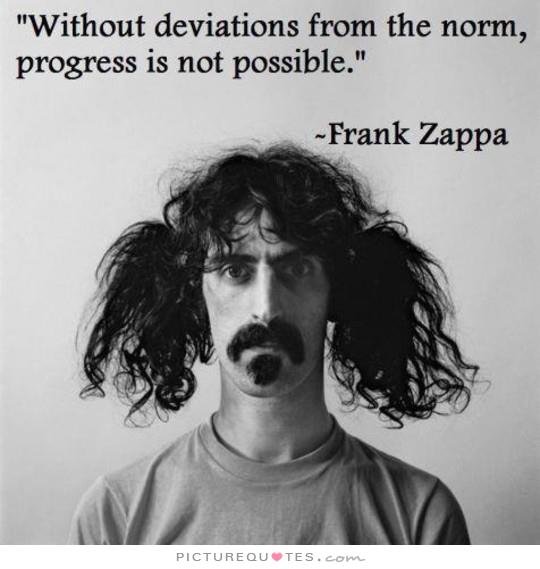[#1] Scientific term of the day: Neurodiversity
Hello Steemians!
With this post I'd like to start series of post bringing closer some interesting and important scientific term. I find this fascinating how some of scientific advancement and theories are quickly adapted in societies and some are almost unknown, even if they seem revolutionary! I'll try to introduce you to the latter ones. I'll try to write both in scientific and understandable language. I hope, I'll make it. So, please, open your minds and enjoy the ride. The word for today is:
Xenophobia, the fear of different, seems to be one of the biggest driving forces of the shape of social relationships across history. So called "majority" used to enforce standards of what was normal and accepted to the rest of the people. However, we can observe interesting process of broadening what we call normal, people of color gain more and more appreciation, nobody tries, any more to cure homosexual people and people with disabilities are able to function much better in our world. It's nice.
Thanks to a science we understand that gay people doesn't tear apart families, drug abuse is more medical problems than criminal and we can live safely with people with AIDS. Those understandings allow us to be as a society more accepting, tolerating and nice to each other, at least in those of countries which are wealthy and civilized enough to appreciate the fact, we are different. We are also beginning to understand it's very common that "those others" can be the most innovative and bring us further.

Neurodiveristy is approach towards different understanding of many neurological conditions as result of normal variety within human genome. Neurodiverse point of view doesn't see people who need cure but it claims those conditions should be viewed and respected as social categories, similarly as gender, ethnicity or sexual orientation. It's just matter of changing perception of "normal". Try to view it in that way; for person with autism, "healthy" people would seem to have problems with holding their attention for longer time, highly obsessed with social interaction and completely neglecting details. How would social norms look in the world filled with autistic people? Who knows?
That view promotes self-advocacy of members of community, it that case, people with various conditions. It was for people within specter of autism to start this movement but later also different conditions started to be seen as sign of neurodiversity, such as: ADHD, schizophrenia, bipolarity, dyslexia, OCD among few others. This change in perception challenges social norms and stigmas, and bring back power to the people, recognizing condition just as different way of expressing themselves and perceiving the world around.
With any drawback comes one strength, just range of these abilities seems to be much wider than among typical people. For example people with ADHD are believed to have problems with keeping focus for longer time but if they find something very interesting they can attain the state of hyper-focus and spend there long time, while the world around is gone. For any others it demands years of training to gain that ability.
Very often also people with autism has some unbelievable "superpowers" connected with memory, math abilities or artistic talents. It takes just very friendly and open environment to foster these abilities and live happy life for many. What I'm trying to say is fact that maybe, just maybe, a lot of people's suffering may come from hostile environment, lack of love and understanding, to high expectations or lack of knowledge about certain type of world-processing. At the end we all can benefit from appreciating different way of living.
This point of view meets some resistance in medical circles, it's argued that it's too simple solution for complex problem, and belittling of patient's suffering. For doctors, it's clear; those are heavy disorders, deficits, and dysfunctions and as those demand medical treatment and more focus on looking for cure. I's also said that this term may apply just to people with milder form of impairment but the rest of people, those with more severe disorders cannot live without treatment and a professional assistance.
Who knows? Maybe with advancement in a medical science and technology we will be able to cure/change those states, or we will be able to provide opportunities for people with various conditions to live happier and more independent lives without need to change their neural routes.
Of course a lot of education and research is needed to fulfill the potential within this particular approach and give back power to those who are born with those gifts. At the end not doctors, not parents and not teachers are living their whole lives that way.
For those who would like to dive deeper:
Amazing TED talk about autism which inspired me to write this post
Article in Wikipedia about neurodiversity which was the main base of knowledge for me
Fascinating! This is a topic that's close to my heart, but it's all quite new to me as well. Thank you for writing such an eloquent article on Neurodiversity. I'm a little bit jealous!
Thank you for answer, I'm glad you like it, hopefully more and more people will get to know it. For me is also new point of view but I find it very convincing.
While I was just browsing around Steemit, I just stumbled across this:
https://steemit.com/science/@aronexxon/1-scientific-term-of-the-day-neurodiversity-a5cfaeb38fcdf
I've already flagged it, but recommend you do too.
Thanks mate! I reported it to steemcleaners.
Congratulations @deepresearch! You have completed some achievement on Steemit and have been rewarded with new badge(s) :
Click on any badge to view your own Board of Honor on SteemitBoard.
For more information about SteemitBoard, click here
If you no longer want to receive notifications, reply to this comment with the word
STOPBeing A SteemStem Member